一般过去时基本结构及练习
- 格式:doc
- 大小:31.50 KB
- 文档页数:6
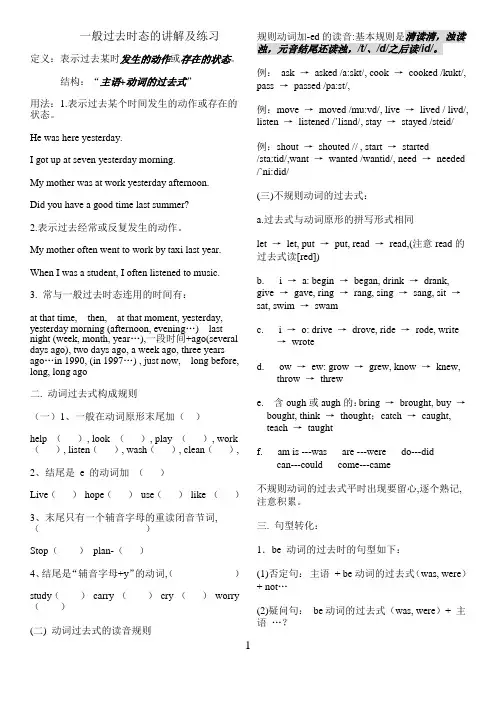
一般过去时态的讲解及练习定义:表示过去某时发生的动作或存在的状态。
结构:“主语+动词的过去式”用法:1.表示过去某个时间发生的动作或存在的状态。
He was here yesterday.I got up at seven yesterday morning.My mother was at work yesterday afternoon.Did you have a good time last summer?2.表示过去经常或反复发生的动作。
My mother often went to work by taxi last year. When I was a student, I often listened to music.3. 常与一般过去时态连用的时间有:at that time, then, at that moment, yesterday, yesterday morning (afternoon, evening…) last night (week, month, year…),一段时间+ago(several days ago), two days ago, a week ago, three years ago…in 1990, (in 1997…) , just now, long before, long, long ago二. 动词过去式构成规则(一)1、一般在动词原形末尾加()help (), look (), play (), work (), listen(), wash(), clean(), 2、结尾是e 的动词加()Live()hope()use()like ()3、末尾只有一个辅音字母的重读闭音节词,()Stop()plan-()4、结尾是“辅音字母+y”的动词,()study()carry ()cry ()worry ()(二) 动词过去式的读音规则规则动词加-ed的读音:基本规则是清读清,浊读浊,元音结尾还读浊,/t/、/d/之后读/id/。
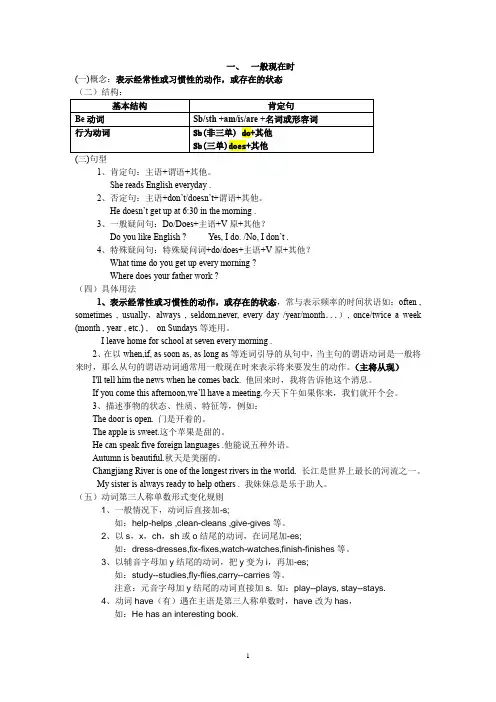
一、一般现在时(一)概念:表示经常性或习惯性的动作,或存在的状态1、肯定句:主语+谓语+其他。
She reads English everyday .2、否定句:主语+don’t/doesn’t+谓语+其他。
He doesn’t get up at 6:30 in the morning .3、一般疑问句:Do/Does+主语+V原+其他?Do you like English ? Yes, I do. /No, I don’t .4、特殊疑问句:特殊疑问词+do/does+主语+V原+其他?What time do you get up every morning ?Where does your father work ?(四)具体用法1、表示经常性或习惯性的动作,或存在的状态,常与表示频率的时间状语如:often , sometimes , usually,always , seldom,never, every day /year/month...), once/twice a week (month , year , etc.) , on Sundays等连用。
I leave home for school at seven every morning .2、在以when,if, as soon as, as long as等连词引导的从句中,当主句的谓语动词是一般将来时,那么从句的谓语动词通常用一般现在时来表示将来要发生的动作。
(主将从现)I'll tell him the news when he comes back. 他回来时,我将告诉他这个消息。
If you come this afternoon,we’ll have a meeting.今天下午如果你来,我们就开个会。
3、描述事物的状态、性质、特征等,例如:The door is open. 门是开着的。
The apple is sweet.这个苹果是甜的。
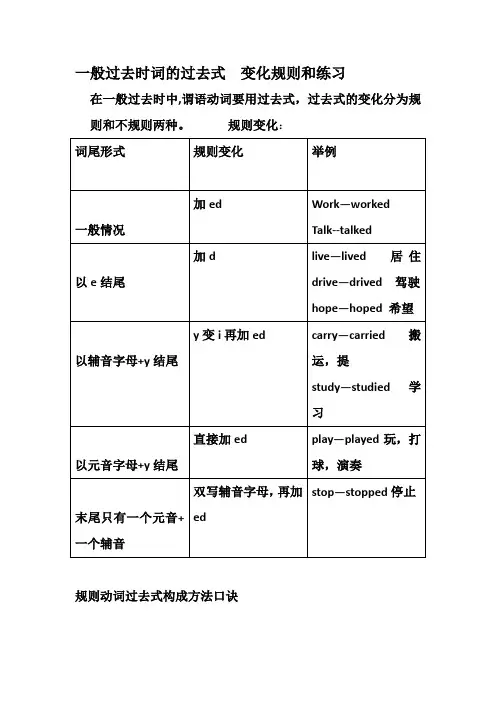
一般过去时词的过去式变化规则和练习在一般过去时中,谓语动词要用过去式,过去式的变化分为规则和不规则两种。
规则变化:规则动词过去式构成方法口诀过去式构成有规律,一般词尾加ed ,如果词尾有个e, 只要直接加上d,辅音字母加上y, 变y为i加ed, 一个元音一个辅音,双写词尾加ed●过去式词的练习try____ cry____ stay____ walk____ watch____ open____ close____ rain____ turn_____ arrive______ help______ listen______ change____ look____ reply ____ want____ beg____ plan____ prefer ____ like ______ dance______ love____ look _____ tidy____ wash_____● 1. I ____ ( work) to the school yesterday.2.She ____ (drive) a bus before.3. It ____ (rain) lastSunday.4. The dog _____ (help) the blind man two years ago.5. I ____ (listen) to the music last night.6. The little sister _____ (dance) last night.7. The bus _____(stop) yesterday afternoon.8. We _____(tidy) up the room. 9. I ______(close) thewindow yesterday .10. I ____(like) to eat apple before. 11. I ______(wash) myT-shirt.12. They ____(dance) together last night. 14. The old man _____(beg) on13. He _____( reply) to the letter yesterday. the street.。
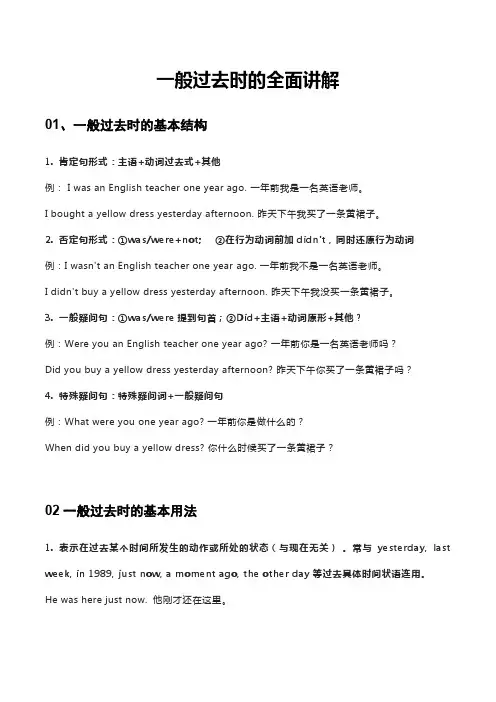
一般过去时的全面讲解01、一般过去时的基本结构1. 肯定句形式:主语+动词过去式+其他例: I was an English teacher one year ago. 一年前我是一名英语老师。
I bought a yellow dress yesterday afternoon. 昨天下午我买了一条黄裙子。
2. 否定句形式:①was/were+not; ②在行为动词前加didn't,同时还原行为动词例:I wasn't an English teacher one year ago. 一年前我不是一名英语老师。
I didn't buy a yellow dress yesterday afternoon. 昨天下午我没买一条黄裙子。
3. 一般疑问句:①was/were提到句首;②Did+主语+动词原形+其他?例:Were you an English teacher one year ago? 一年前你是一名英语老师吗?Did you buy a yellow dress yesterday afternoon? 昨天下午你买了一条黄裙子吗?4. 特殊疑问句:特殊疑问词+一般疑问句例:What were you one year ago? 一年前你是做什么的?When did you buy a yellow dress? 你什么时候买了一条黄裙子?02一般过去时的基本用法1. 表示在过去某个时间所发生的动作或所处的状态(与现在无关)。
常与yesterday, last week, in 1989, just now, a moment ago, the other day等过去具体时间状语连用。
He was here just now. 他刚才还在这里。
What did you do yesterday? 你昨天做了什么事?2. 在过去一段时间内的经常性或习惯性动作。
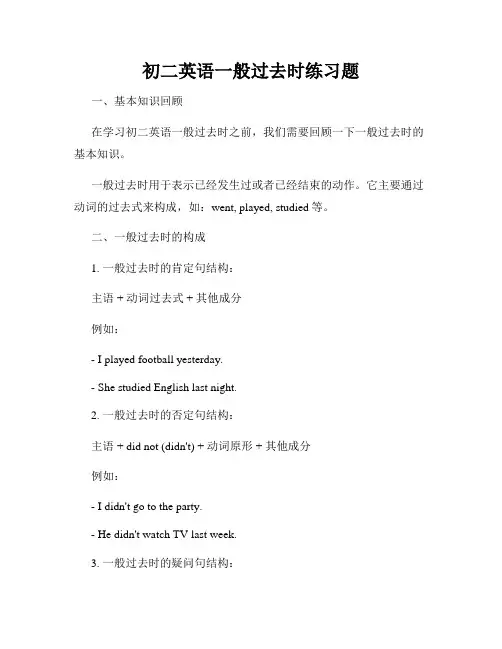
初二英语一般过去时练习题一、基本知识回顾在学习初二英语一般过去时之前,我们需要回顾一下一般过去时的基本知识。
一般过去时用于表示已经发生过或者已经结束的动作。
它主要通过动词的过去式来构成,如:went, played, studied等。
二、一般过去时的构成1. 一般过去时的肯定句结构:主语 + 动词过去式 + 其他成分例如:- I played football yesterday.- She studied English last night.2. 一般过去时的否定句结构:主语 + did not (didn't) + 动词原形 + 其他成分例如:- I didn't go to the party.- He didn't watch TV last week.3. 一般过去时的疑问句结构:Did + 主语 + 动词原形 + 其他成分?例如:- Did you visit your grandparents?- Did they eat lunch at the restaurant?三、一般过去时的用法1. 表示过去的经历、经验或者事件:- We visited the museum yesterday.- He lived in Paris when he was young.2. 表示过去的习惯或者常态:- She always played the piano after school.- We usually went to the park on weekends. 3. 用于时间和条件从句中:- If it rained, we stayed at home.- When I was a child, I loved to play with toys.四、一般过去时的练习题1. 选择正确的动词形式填空。
a) Yesterday, she (go/gone) to the beach.b) We (watched/watch) a movie last night.c) He (played/play) soccer with his friends on Saturday.d) They (visited/visit) their grandparents during the summer vacation.2. 改写下列句子,使用一般过去时。
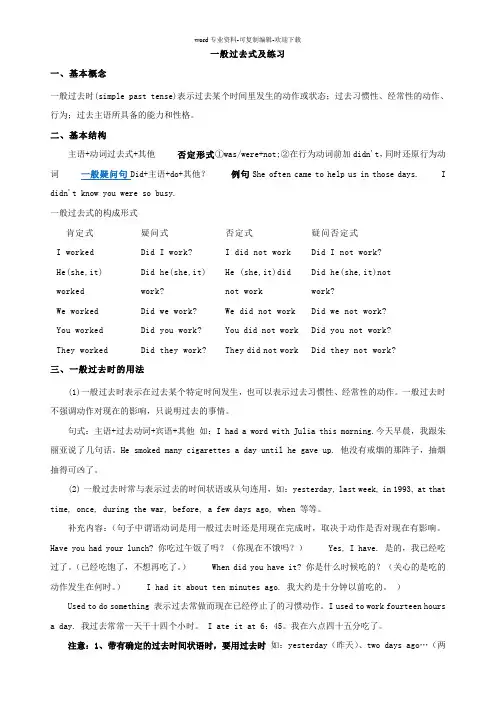
一般过去式及练习一、基本概念一般过去时(simple past tense)表示过去某个时间里发生的动作或状态;过去习惯性、经常性的动作、行为;过去主语所具备的能力和性格。
二、基本结构主语+动词过去式+其他否定形式①was/were+not;②在行为动词前加didn't,同时还原行为动词主语+do+其他?例句She often came to help us in those days. Ididn't know you were so busy.一般过去式的构成形式肯定式疑问式否定式疑问否定式I worked Did I work? I did not work Did I not work?He(she,it) worked Did he(she,it)work?He (she,it)didnot workDid he(she,it)notwork?We worked Did we work? We did not work Did we not work?You worked Did you work? You did not work Did you not work?They worked Did they work? They did not work Did they not work?三、一般过去时的用法(1)一般过去时表示在过去某个特定时间发生,也可以表示过去习惯性、经常性的动作。
一般过去时不强调动作对现在的影响,只说明过去的事情。
句式:主语+过去动词+宾语+其他如:I had a word with Julia this morning.今天早晨,我跟朱丽亚说了几句话。
He smoked many cigarettes a day until he gave up. 他没有戒烟的那阵子,抽烟抽得可凶了。
(2)一般过去时常与表示过去的时间状语或从句连用,如:yesterday, last week, in 1993, at that time, once, during the war, before, a few days ago, when 等等。
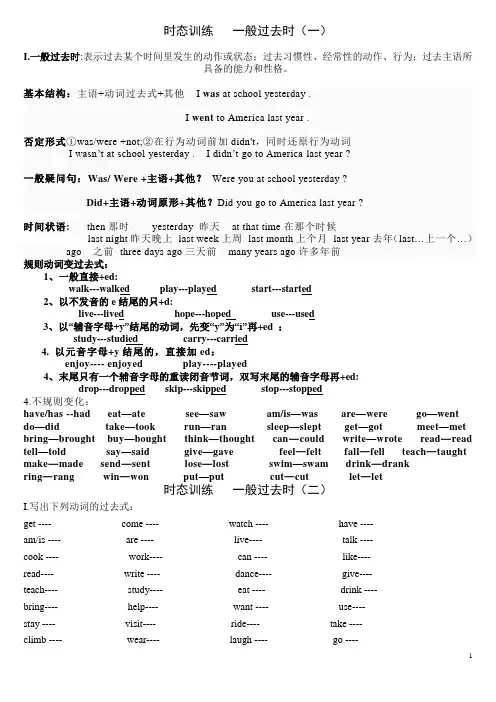
时态训练一般过去时(一)I.一般过去时:表示过去某个时间里发生的动作或状态;过去习惯性、经常性的动作、行为;过去主语所具备的能力和性格。
基本结构:主语+动词过去式+其他I was at school yesterday .I went to America last year .否定形式①was/were +not;②在行为动词前加didn't,同时还原行为动词I wasn’t at school yesterday . I didn’t go to America last year ?一般疑问句:Was/ Were +主语+其他?Were you at school yesterday ?Did+主语+动词原形+其他?Did you go to America last year ?时间状语: then那时yesterday 昨天at that time在那个时候last night昨天晚上last week上周last month上个月last year去年(last…上一个…)ago 之前three days ago三天前many years ago许多年前规则动词变过去式:1、一般直接+ed:walk---walked play---played start---started2、以不发音的e结尾的只+d:live---lived hope---hoped use---used3、以“辅音字母+y”结尾的动词,先变“y”为“i”再+ed:study---studied carry---carried4.以元音字母+y结尾的,直接加ed:enjoy---- enjoyed play----played4、末尾只有一个辅音字母的重读闭音节词,双写末尾的辅音字母再+ed:drop---dropped skip---skipped stop---stopped4.不规则变化:have/has --had eat—ate see—saw am/is—was are—were go—went do—did take—took run—ran sleep—slept get—got meet—met bring—brought buy—bought think—thought can—could write—wrote read—read tell—told say—said give—gave feel—felt fall—fell teach—taught make—made send—sent lose—lost swim—swam drink—drankring—rang win—won put—put cut—cut let—let时态训练一般过去时(二)I.写出下列动词的过去式:get ----_________ come ----_________ watch ----_________ have ----_________am/is ----_________ are ----_________ live----_________ talk ----_________cook ----_________ work----_________ can ----_________ like----_________read----_________ write ----_________ dance----_________ give----_________teach----_________ study----_________ eat ----_________ drink ----_________bring----_________ help----_________ want ----_________ use----_________stay ----_________ visit----_________ ride----_________ take ----_________climb ----_________ wear----_________ laugh ----_________ go ----_________sleep----_________ put----_________ borrow ----_________ wait----_________ send----_________ tell----_________ carry ----_________ drop----_________ make ----_________ finish----_________ run ----_________ meet----_________ walk----_________ see----_________ wash ----_________ bump ----_________ play----_________ skip----_________ ring ----_________ carry ----_________ win ----_________ lose----_________ listen----_________ fall ----_________ photo ----_________ rain ----_________ jump----_________ happen----________ hope ----_________ look ----_________ stop ----_________ swim ----_________一般过去时(三)单项选择( )1. What did you do at the weekend? _________A. I visit a lot of placesB. I visited lots of placesC. We visit lots of places.( )2. Where did you go? A. We went to the British MuseumB. We go to the parkC. It’s a wonderful placeD. I don’t understand( )3. Did Lingling like the London Eye?_____A. Yes, she doB. Yes, she didC. Yes, he didD. No. he didn’t( ) 4.She liked the bus ride______ .A. bestB. betterC. goodD. bad( )5. Did Daming and his father take photos of the mountains? ______________A. Yes, he didB. No, he didn’tC. No, they didD. Yes, they did( ) 6. They ______ there at ten o’clock last Sunday.A. goB. wentC. goes( ) 7. Then they ______ for one hour to Badaling yesterday.A. walkB. walkedC. walking( )8. They ___ photos of the mountains last Wednesday.A. tookB. takeC. takes( ) 9.They _______young then.A. areB. wereC. isD. was( )10.I ______ two years old thenA. isB. wereC. wasD. are( )11.I _______nine years old last year.A. isB. wereC. amD. was( )12.She _____tall then .A. isn’tB. weren’tC. areD. wasn’t( )13.I _______tall then .A. isn’tB. weren’tC. areD. wasn’t( )14. I ___my mother yesterday.A. helpB. helpedC. helpsD. helping( )15 He ______ in the park yesterday.A. ranB. runsC. runD. running( )16.They _______last evening. A. dance B. danced C. dance D. dances ( )17.She ______ to school at 8 o’clock yesterday morning . A. go B. goes C. went ( )18.They______ lunch at 1 o’clock then. A. had B. has C. have( )19. ______you visit vegetables at Shouguang last year? A. Do B. Does C. Did ( )20 When did you come back?___________A. He came back last SundayB. Yes, we didC. We came back last SundayD. We come back last Sunday( )21.I _______ in Shanghai last term. But now I ______ in Beijing.A. study, studiedB. studied, studiedC. studied, study( )22.He ______ up late this morning . A. get B. gets C. got D. getting( )23. My sister _______ all day yesterday.A. didn’t cryB. didn’t criedC. doesn’t cryD. doesn’t cried( ) 24.What ____ you ____ last night?A. do , doB. do, didC. did, didD. did , do( )25. I ________ in the park last night. A. walk B. walked C. walkingI:句型转换1.The children had a good time in the park.否定句:__________________________________________一般疑问句:________________________________________对划线部分提问:____________________________________2. There were about nine hundred people at the concert.(音乐会)否定句:__________________________________________一般疑问句:________________________________________对划线部分提问:____________________________________4. Ann did her homework yesterday evening.否定句:__________________________________________一般疑问句:________________________________________对划线部分提问:____________________________________5. Last week I read an English book.否定句:__________________________________________一般疑问句:________________________________________肯定/否定回答:____________________________________对划线部分提问:____________________________________时态训练一般过去时(四)III:根据要求改写下列句子,每空一词1.They went to the cinema.(一般疑问句)_________ they _________ to the cinema?2. Jim’s weekend was very great. (就划线部分提问)_____ _______ Jim’s weekend?3. He practiced English last weekend. (就划线部分提问)________ ____________ he _____________ last weekend?4. He moved to Wuhan because his father worked there.(就划线部分提问) ________ _________ he __________ to Wuhan?5. They did their homework last night.(变否定句)They _________ _________ their homework last night.6. She did her homework last night. (否定句)She _______ _______ her homework last night.7. Anita studied for math test last Sunday. (一般疑问句)_______ Anita______ for math test last night?8. I went to the beach yesterday. ( 一般疑问句并否定回答)_____ you _____ to the beach yesterday? _______, I ______III.单项选择()1. Last week, my good friend and I ________ a movie.A. seeB. sawC. watchD. looked()2. I ________ English yesterday evening.A. studyB. studiedC. studyedD. studies()3. Did he _______ to sleep late last night ?A. wentB. goC. goesD. going()4. — ________ was your weekend? — It was not good.A. WhatB. WhereC. HowD. Why()5. —What did you do last weekend? _________ my friends .A. visitsB. visitedC. visitingD. visit()6. Mary _______ swimming with them last Friday.A. doesn’t goB. wasn’t goingC. didn’t goD. isn’t going ()7. My mother is always busy. What about ____________?A. yourB. itC. yoursD. its()8.—Did you do some shopping last week? —_______.A .Yes,I did B. Yes,I do C. No,I don’t D No, I didn’t ( ) 9.—_______did Sally_______ on Sunday? —She went to Beijing.A. What; doB. Where; goesC. Where; goD. What ; did ( ) 15. Where_______your parents last night? –They were at home .A .wasB .isC .are D. were( )16. Susan likes _______.A. singingB. singC. singsD. sang( )17. Some of ______ can speak English.A. themB. theirsC. theyD. their( )18. What ____ Tom and his mother like ?A. doesB. doC. isD. are( )19. Tom can ______ some vegetables at the market.A. buysB. buyingC. buyD. to buyIV. 用所给词的适当形式填空。
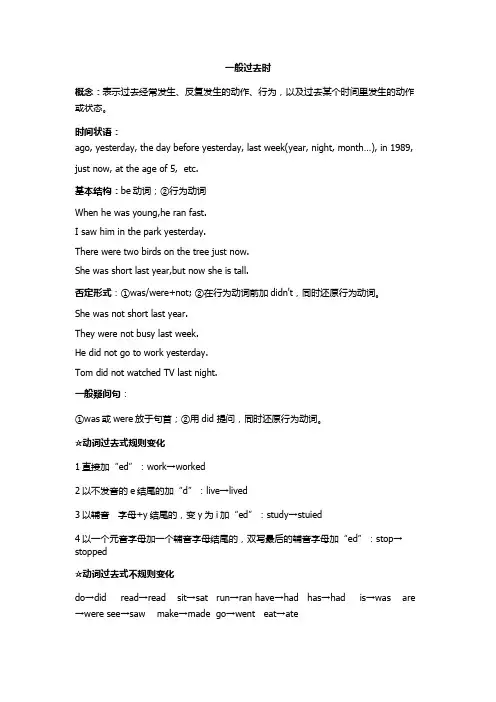
一般过去时概念:表示过去经常发生、反复发生的动作、行为,以及过去某个时间里发生的动作或状态。
时间状语:ago, yesterday, the day before yesterday, last week(year, night, month…), in 1989, just now, at the age of 5, etc.基本结构:be动词;②行为动词When he was young,he ran fast.I saw him in the park yesterday.There were two birds on the tree just now.She was short last year,but now she is tall.否定形式:①was/were+not; ②在行为动词前加didn't,同时还原行为动词。
She was not short last year.They were not busy last week.He did not go to work yesterday.Tom did not watched TV last night.一般疑问句:①was或were放于句首;②用did 提问,同时还原行为动词。
☆动词过去式规则变化1直接加“ed”:work→worked2以不发音的e结尾的加“d”:live→lived3以辅音字母+y结尾的,变y为i加“ed”:study→stuied4以一个元音字母加一个辅音字母结尾的,双写最后的辅音字母加“ed”:stop→stopped☆动词过去式不规则变化do→did read→read sit→sat run→ran have→had has→had is→was are →were see→saw make→made go→went eat→ate一般过去时的练习一、用所给的动词的适当形式填空。
⒈He ___________(visit) the Great Wall last year.2.We____________(have) a good time yesterday.3.We often __________(go) to school by bus last year.4.I __________(live)in the village when I was a child.5.Mike__________(see) a big tiger in the nature park last year.6.Sam___________ (do) the housework yesterday.7.________(do) you _________(enjoy) yourself yesterday?8.________(do)you __________(play) the violin in the artroom yesterday?9.I __________ (eat) a big pizza yesterday.10.There_________ (be) many sheep on the farm last year.11. I _________ (watch) a cartoon on Saturday.12. Her father __________ (read) a newspaper last night.13. We _________ to zoo yesterday, we ___________ to the park. (go)14. _________ you __________ (visit) your relatives last Spring Festival?15. _________ he __________ (fly) a kite on Sunday? Yes, he __________.二、单项选择( ) 1. She watered the flowers ________.A tomorrowB sometimesC yesterday morning( ) 2.What ____ Mike do last weekend ?A doB doesC did( ) 3. I ___ my room last Sunday.A cleanedB cleanC am cleaning( ) 4. _____ you _____ TV last night .A Do, watchB Did, watchC Did, watched( ) 5.---Did your father write an e-mail yesterday ?A Yes, he did.B Yes, he doesC No, he don’t( ) 6.They _____ on a trip in February ,2007.A are goingB goingC went( ) 7. ____ he ____ football two days ago?A Does , playB Did , playedC Did , play三、Be动词的过去时练习(一)用be动词的适当形式填空。
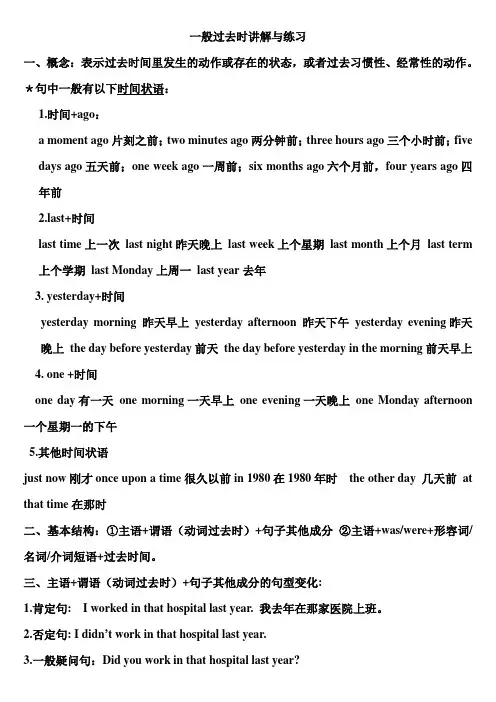
一般过去时讲解与练习一、概念:表示过去时间里发生的动作或存在的状态,或者过去习惯性、经常性的动作。
*句中一般有以下时间状语:1.时间+ago:a moment ago片刻之前;two minutes ago两分钟前;three hours ago三个小时前;fivedays ago五天前;one week ago一周前;six months ago六个月前,four years ago四年前st+时间last time上一次last night昨天晚上last week上个星期last month上个月last term 上个学期last Monday上周一last year去年3. yesterday+时间yesterday morning 昨天早上yesterday afternoon 昨天下午yesterday evening昨天晚上the day before yesterday前天the day before yesterday in the morning前天早上4. one +时间one day有一天one morning一天早上one evening一天晚上one Monday afternoon 一个星期一的下午5.其他时间状语just now刚才once upon a time很久以前in 1980在1980年时the other day 几天前at that time在那时二、基本结构:①主语+谓语(动词过去时)+句子其他成分②主语+was/were+形容词/名词/介词短语+过去时间。
三、主语+谓语(动词过去时)+句子其他成分的句型变化:1.肯定句: I worked in that hospital last year. 我去年在那家医院上班。
2.否定句: I didn’t work in that hospital last year.3.一般疑问句:Did you work in that hospital last year?4.肯定和否定回答: Yes, I did. No, I didn’t.四、主语+was/were+形容词/名词/介词短语+过去时间的句型变化1.肯定句: I was fat three years ago. 我三年前很胖。
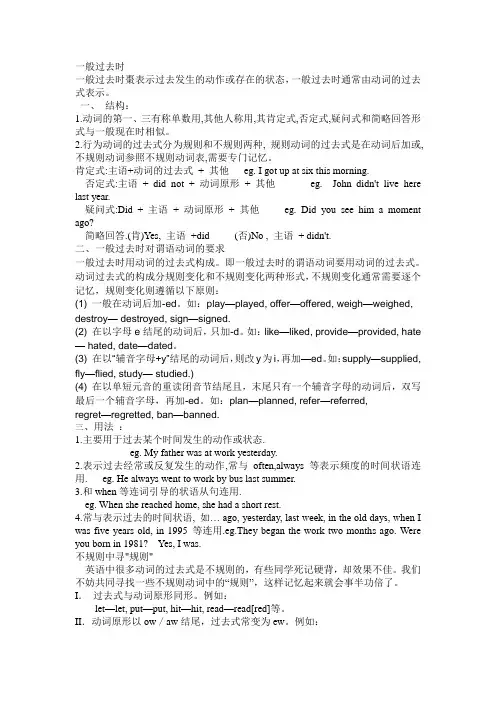
一般过去时一般过去时棗表示过去发生的动作或存在的状态,一般过去时通常由动词的过去式表示。
一、结构:1.动词的第一、三有称单数用,其他人称用,其肯定式,否定式,疑问式和简略回答形式与一般现在时相似。
2.行为动词的过去式分为规则和不规则两种, 规则动词的过去式是在动词后加或,不规则动词参照不规则动词表,需要专门记忆。
肯定式:主语+动词的过去式+ 其他eg. I got up at six this morning.否定式:主语+ did not + 动词原形+ 其他eg. John didn't live here last year.疑问式:Did + 主语+ 动词原形+ 其他eg. Did you see him a moment ago?简略回答.(肯)Yes, 主语+did (否)No , 主语+ didn't.二、一般过去时对谓语动词的要求一般过去时用动词的过去式构成。
即一般过去时的谓语动词要用动词的过去式。
动词过去式的构成分规则变化和不规则变化两种形式,不规则变化通常需要逐个记忆,规则变化则遵循以下原则:(1) 一般在动词后加-ed。
如:play—played, offer—offered, weigh—weighed, destroy— destroyed, sign—signed.(2) 在以字母e结尾的动词后,只加-d。
如:like—liked, provide—provided, hate — hated, date—dated。
(3) 在以“辅音字母+y”结尾的动词后,则改y为i,再加—ed。
如:supply—supplied, fly—flied, study— studied.)(4) 在以单短元音的重读闭音节结尾且,末尾只有一个辅音字母的动词后,双写最后一个辅音字母,再加-ed。
如:plan—planned, refer—referred, regret—regretted, ban—banned.三、用法:1.主要用于过去某个时间发生的动作或状态.eg. My father was at work yesterday.2.表示过去经常或反复发生的动作,常与often,always 等表示频度的时间状语连用. eg. He always went to work by bus last summer.3.和when等连词引导的状语从句连用.eg. When she reached home, she had a short rest.4.常与表示过去的时间状语, 如… ago, yesterday, last week, in the old days, when I was five years old, in 1995 等连用.eg.They began the work two months ago. Were you born in 1981? Yes, I was.不规则中寻"规则"英语中很多动词的过去式是不规则的,有些同学死记硬背,却效果不佳。
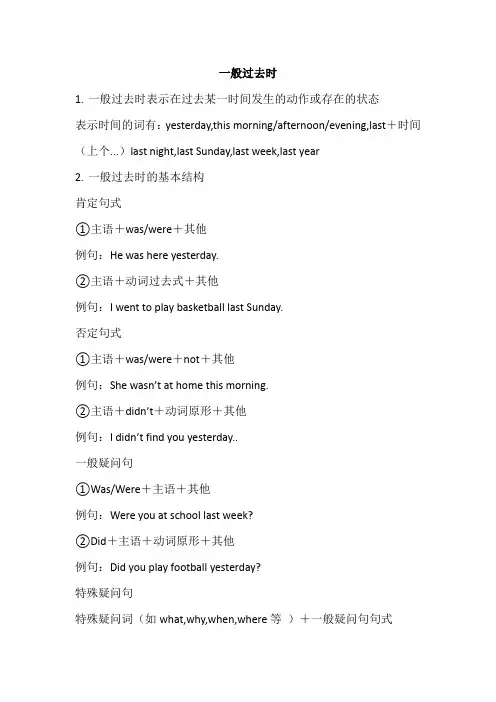
一般过去时1.一般过去时表示在过去某一时间发生的动作或存在的状态表示时间的词有:yesterday,this morning/afternoon/evening,last+时间(上个...)last night,last Sunday,last week,last year2.一般过去时的基本结构肯定句式①主语+was/were+其他例句:He was here yesterday.②主语+动词过去式+其他例句:I went to play basketball last Sunday.否定句式①主语+was/were+not+其他例句:She wasn’t at home this morning.②主语+didn’t+动词原形+其他例句:I didn’t find you yesterday..一般疑问句①Was/Were+主语+其他例句:Were you at school last week?②Did+主语+动词原形+其他例句:Did you play football yesterday?特殊疑问句特殊疑问词(如what,why,when,where等)+一般疑问句句式例句:Where were you yesterday?What did you do yesterday?3.动词的过去式规则动词①一般情况下直接在动词后+ed例:work-worked look-looked walk-walked②以e结尾的单词直接+d例:live-lived hope-hoped use-used③以辅音字母+y结尾的,改y为i再+ed例:study-studied carry-carried以元音字母+y,直接+ed例:enjoy-enjoyed play-played⑤以重读、一个辅音字母结尾的闭音节结尾的动词,双写最后的辅音字母+ed例:stop-stopped plan-planned prefer-preferred不规则动词(书本76页表格)动词原形过去式动词原形过去式is/am was do didare were get gotbegin began go wentbuy bought have hadcome came make maderead read see sawrun ran take tookeat ate一般过去时练习题一、写出下列动词的过去式1.is/am_____2.fly_____3.plant_____4.are_____5.drink_____6.play_____7.go_____8.make_____9.do_____10.dance_____11.worry_____12.ask_____13.eat_____14.pass_____二、用所给动词的适当形式填空1.He_____(be)at home last night.2.He_____(visit)the Great Wall last year.3.We_____(have)a good time yesterday.4.We_____(go)to school by bus last year.5.Sam_____(did)the housework yesterday.6._____(do)you______(play)the violin this morning?三、选择题1.The two girls____all in Class1last year.A.areB.wasC.were.D is2.This morning he____a taxi.A.tookB.takesC.take.D is taking3.I_____to school at8o’clock yesterday.A.goB.am goingC.went D goes4.-What did you do last night?-I______a story bookA.readB.readedC.am reading D reads。
一般过去时语法规则及练习一般过去时表示过去某一时候或某一段时间所发生了的事情或存在的状态。
常与表示过去时间的词或短语yesterday, this morning, just now, a moment ago, a week ago, in May, in 2015, last night, last month, last year, last week, once upon a time, the other day, before, in the pas t等连用。
1.0 一般过去时的几种形式1.1be 动词的形式was, were,即(am, is ), are 过去式的形式,例如:I was very tired yesterday.我昨天很累。
He was angry last night. 他昨天晚上生气了。
There were some horses on the grassland a week ago. 一周前草地上有一些马。
I was n’t in last night. 昨晚我没在家。
变疑问句:把was, were提到句子主语前面,例如:Were you tired yesterday?你昨天累吗?Was he at home last night?他昨晚在家吗?变否定句:在was, were后面加not即可,可以缩写为wasn’t, weren’t.例如:He wasn’t angry yesterday. 他昨天没生气。
I was n’t there last night.昨晚我没在那。
They weren’t at school yesterday. 他们昨天没上学。
1.2一般动词即实义动词或行为动词的形式,即一般动词的过去时构成的句子,如:He went swimming yesterday afternoon. 他昨天下午去游泳了。
What did you do yesterday? 昨天你干什么了?I met Mike this morning. 今天上午我遇见迈克了。
一般过去时的概念:一般过去时表示过去某个时间发生的动作或存在的状态。
常和表示过去的时间状语连用,如:last year, yesterday等。
例如:I saw him in the street yesterday. 昨天我在街上看见他了。
一般过去时的结构1、肯定形式:主语+动词过去式+其他例句:She often came to help us in those days.2、否定形式:①was/were+not;②在行为动词前加didn't,同时还原行为动词例句:I didn't know you like coffee.3、一般疑问句:①Did+主语+谓语动词原型+其他?②WasWere+主语+表语?例如:-Did you go to Beijing last week?-Yes, we did. (No, we didn't.)4、一般过去时的特殊疑问句的构成:疑问词+did+主语+动词原形+其它?例如:-What did you do last night?-I did my homework.动词过去式的构成:(1)规则动词过去式的构成有四条规则:①一般在动词原形末尾直接加上-ed。
如:look-looked。
②以不发音的字母e结尾的动词,去e再加-ed。
如:live-lived。
③末尾只有一个辅音字母的重读闭音节(辅元辅结构),先双写这个辅音字母,再加-ed。
如:stop-stopped。
④末尾是辅音字母+y结尾的动词,先变y为i,然后再加-ed。
如:study-studied。
(2)不规则动词的过去式需特殊记忆。
如:am(is)-was, are-were, go-went, come-came, take-took, have (has)-had等。
一般过去时口诀一般过去时并不难,表示过去动作、状态记心间。
动词要用过去式,时间状语句末站。
否定句很简单,didn't 站在动词原形前,其它部分不要变。
一般过去时一、一般过去时概述一般过去时表示过去某个时间里发生的动作或状态;过去习惯性、经常性的动作、行为;过去主语所具备的能力和性格,如:We went back to the park with Andy. 我们和安迪回到公园What did you eat yesterday你昨天吃了些什么二、一般过去时的构成及用法(1)它的结构一般为:主语+谓语(动词过去式)+句子其他成分;主语+was/were+形容词/名词/介词短语+过去时间;否定形式:①was/were+ not; ②在行为动词前加didn't,同时还原行为动词;一般疑问句: ①Did+主语+do+其他;②Was/Were+主语+其他,如:He travelled around over 80 countries by bicycle.他骑着自行车环游了大概80多个国家。
Myschooltripwasgreat.我的学校郊游棒极了。
Nancy wasn’t happy last Friday. 上星期五南希不高兴。
I didn't know you like coffee.我不知道你喜欢咖啡。
Didyougotothebeach你们去海滩了吗—Yes,wedid./No,wedidn’t.是的,我们去了。
/不,我们没有。
WasyourweekendOK你的周末过得还行吧—Yes,itwas./No,itwasn’t.是的,还行。
/不,不行。
1.【2015年南京市中考英语试卷】--Why didn’t Peter______ his homework -- He said he hadlost hisworkbook. I think it’s an excuse.A.doesB. doingC. doD. did 【答案】C【解析】试题分析:句意:——为什么彼得没有做他的家庭作业——他说他弄丢了他的作业本,我认为这是个借口。
一般过去时详细讲解与练习题一般过去时详细讲解与练习题一、巧记一般过去时:表示过去发生的动作或存在的状态。
谓语动词过去式,过去时间作标志;否定句很简单,主语之后didn’t添;疑问句也不难,did放在主语前;不含be动词时如果谓语之前有did,谓语动词需还原;动词若是was, were,否定就把not添。
含be动词时疑问句也不难,要把was,were放在主语前。
一般过去时:学习一般过去时,有四巧:【一巧】时间状语(即标志词)巧。
一般过去时表示过去发生的动作或存在的状态,恰巧与表示过去的一些时间状语连用。
1. yesterday或以其构成的短语:yesterday morning(afternoon, evening)等;2. 由“last+一时间名词”构成的短语:last night, last year (winter, month, week)等;3. 由“时间段+ago”构成的短语:a moment ago, a short time ago, an hour ago等;4. 其它:just now等5. 由某些表示过去时态的从句等。
【二巧】形式巧。
它与一般现在时一样,形式多样:表示状态时,当主语是第一人称单数或第三人称单数时,谓语动词用was;主语是第二人称或其他人称复数时,谓语动词用were;表示动作时,使用动词的过去式,looked ,went ,等等。
例如:i was in the classroom yesterday morning.昨天早上我在教室里。
he went to school last Monday. 上周一他去了学校。
【三巧】否定句结构巧。
1.含be动词时:与动词be的一般现在时一样,它在动词后面加not即可变成否定句,并且was, were与not可以缩写成wasn't, weren't。
即:主语+wasn't/weren't +表语+其他。
一般过去时态讲解与练习一般过去时主要表示过去某时发生的动作或情况;结构是“主语+动词的过去式”可以从以下几个方面来理解:1、过去某个时间所发生的动作或存在的状态,句中有明确的表示过去的时间状语如:yesterday 昨天, last night昨晚, last week上个星期, four days ago四天前, in 2002在2002年, just now刚才, the day before yesterday前天等;表示在过去某个时间发生的动作或情况;e.g. I bought a new shirt yesterday. He wasa worker two years ago.2、过去一段时间内,经常性或习惯性的动作;e.g. When I was a child,I often played with fire. Li Lei always walked to school last term.3、谈到已故人的情况时多用过去时;e.g. Lu Xun was a great writer.4有些发生时间不是很清楚的情况,实际是过去发生的,也应用过去时态;e.g. What did you say动词过去式的构成:be动词的过去式为was, were;行为动词的过去式有规则变化和不规则变化两种,规则变化有以下几种情况:1直接在动词原形末尾加-ed. e.g. work-----worked; ask------asked;2以e结尾的动词只加-d. e.g. arrive-----arrived; like-----liked.3末尾只有一个辅音字母的重读闭音节,应先双写这个辅音字母,再加-ed. e.g. shop-----shopped;4以"辅音字母+y"结尾的动词,先把y变成i,再加-ed. e.g. carry----carried; study------studied.不规则动词变过去式见同学们课本的最后一页,e.g. fly------flew; break-----broke; teach-----taught. 这些需要象生单词一样记住.其句式变化分为两种情况:1含有be动词的依然在be上做文章. e.g. I was born in 1980. I was not born in 1980. Were you born in 19802含有行为动词的变否定句要在行为动词前加助动词didn't.,同时把动词变成原形; 变一般疑问句,在句首加助动词did,同时把动词变成原形. e.g. I bought a gift for my mum yesterday. I didn't buy a gift for my mum yesterday. Did you buy a gift for your mum yesterday课后练习一、请写出下列动词的过去式;want arrive enjoy shop is see are eat二、指出下列句中的一处错误,并改正;1. We go to school early yesterday. __________2. She buys a dress last week. ___________3. Did you liked playing football _______4.--- Did you have a good trip --- No, I did. _______5. I enjoied Chinese very much. _______三、翻译下列句子,每空一词;1. 你昨晚去哪了Where ______ you _______ last night2. 我们昨天没有在学校; We __________ at school yesterday.3. 我两小时前在家里; I was at home ______ _______ _______.4. 你上周六去了动物园吗_______ you ________ to the zoo last Saturday5. 我去年不喜欢学数学; I _________ like learning math last year.6. 你昨天在哪儿呢Where ________ you yesterday7. 詹妮喜欢看书;昨晚她看了一本英语书;Jenny likes reading books. She _________ an English book last night.8. 上周六他做什么了他和妈妈去购物了;--- What ________ he _________ last Saturday--- He _________ shopping with his mother.9. 雷锋经常帮助其他人; Lei Feng often ________ other people.10. 我上周没有给你写信; I ________ ________ to you last week. Ⅲ按照括号中的要求改写句子;1. Lucy did her homework at home.改否定句Lucy ___________ ___________ her homework at home.2. She found some meat in the fridge.变一般疑问句___________ she __________ ___________ meat in the fridge3. She stayed there for a week.对划线部分提问__________ ___________ __________ she __________ there4. There was some orange in the cup.变一般疑问句_________ there ___________ orange in the cup5. Li Ming is at school now. 用yesterday 改写句子Li Ming _______ at school yesterday.四、请用正确动词形式填空;1. I _________ an exciting party last weekend. have2. She _______ at home yesterday morning. is3. Tommy __________ TV at his uncle’s last night.watch4. They all _________ to the mountains yesterday morning. go5. My friend, Carol, ________for the math test yesterday evening. study6 They____be on the farm a moment ago.7There____bea shop not long ago.8 Jenny____not goto bed until 11:00 o'clock last night.9 Danny _____read English five minutes ago.10 I _____seeLi Lei ____go out just now.11 He ____dohis homework every day. But he __not doit yesterday.12When I was young, I _____playgames with my friends.13When ____you_____writethis book I _____it last year.14 Did he____have lunch at home五、按照括号中的要求改写句子;11. Lucy did her homework at home.改否定句Lucy ___________ ___________ her homework at home.12. She found some meat in the fridge.变一般疑问句___________ she __________ ___________ meat in the fridge13. She stayed there for a week.对划线部分提问__________ ___________ __________ she __________ there14. There was some orange in the cup.变一般疑问句_________ there ___________ orange in the cup15. Li Ming is at school now. 用yesterday 改写句子Li Ming _______ at school yesterday.要点攻略牢记四个四,学好过去时在这一单元学习中,我们将要学习一种新的时态,那就是一般过去时;那么该如何正确运用这种时态呢没关系,请记好我帮你总结的四个四,相信你能够了解并能熟练地运用了;四种用法①表示在过去某个时间发生的动作或情况;例如:I went to school at 7:00 yesterday morning.我昨天早晨七点去上学;②表示在过去某个时间存在的状态;例如:She was not at home last night.她昨晚八点没在家;③表示在过去经常或反复发生的动作,常和often经常、always总是、sometimes有时等表示频率的时间状语连用;例如:He often had lunch at school last month.他上个月经常在学校吃午饭;④表示已故的人所做的事情或情况;例如:Ba Jin wrote a lot of novels for us.巴金写了很多部小说;四种时间状语①yesterday及相关短语;例如:yesterday morning/afternoon/evening 昨天上午/下午/晚上;②“last+ 时间状语”构成的短语;例如:last night/month/spring/year 昨晚/上个月/去年春天/去年;③“一段时间+ago”组成的短语;例如:three days ago 三天以前 four years ago四年以前;④“介词+ 时间名词”组成的短语;例如:in 1999 在1999年;on the morning of December 25th 在12月25号早上;四种谓语动词的表现形式①be动词的过去式was、were.例如:She was a teacher five years ago. 她五年前是一名教师;②行为动词的过去式,分为规则动词和不规则动词两种;规则动词的过去式的构成遵循以下四个规则:1直接在动词后加ed,例如:help-helped; want-wanted等;2以不发音的字母e结尾时,去掉e加ed 即直接加d , 例如:like-liked; use-used等;3以辅音字母y结尾时,把y变成i再加ed, 例如:carry-carried; study-studied等;4以重读闭音节结尾,双写最后一个辅音字母再加ed, 例如:stop-stopped; shop-shopped等;而不规则动词的过去式则需要我们认真下工夫去记了,例如:go-went; come-came; buy-bought等;③连系动词的过去式;例如:become-became She became angry. 她生气了;④情态动词的过去式+动词原形;例如:I could swim at the age of five. 我五岁时就会游泳了;四种句式的构成①一般过去时态的肯定句式“主语+动词过去式+其它”例如:Jenny bought a skirt yesterday. 詹妮昨天买了一件短裙;②一般过去时态的否定句式“主语+didn’t+动词原形+其它”例如:Jenny didn’t buy a skirt yesterday.詹妮昨天没有买短裙;③一般过去时态的一般疑问句式“Did+主语+动词原形+其它”例如:Did Jenny buy a skirt yesterday詹妮昨天买短裙了吗④一般过去时态的特殊疑问句式“疑问词+did +主语+动词原形+其它”例如:What did Jenny buy yesterday 詹妮昨天买了什么怎么样通过以上的讲解,你对一般过去时态有所了解并能够熟练地运用了吗希望你越学越进2. She was buy a dress last week. ___________________________________________3. Did you liked playing football ___________________________________________4.-Did you have a good trip -No, I didn’t.___________________________________________5. We didn’t flew kites last month. ___________________________________________三训练第三关:翻译句子我最棒;请将下列的汉语句子翻译成正确的英语;1 你昨晚去哪了_______________________________________我去了王府井的一家商店;_____________________________2 李明前天想给妈妈买件大衣,但他没有太多的钱;3 我们去年在南京玩得不快乐;___________________________________________参考答案一般过去时态集中训练营一训练第一关:小小单词难不到我;1. wanted2. arrived3. enjoyed4. shopped5. bought6. saw7. broke8. fell二训练第二关:生病的句子能奈我何1. We went to school early yesterday.2. She bought a dress last week.3. Did you like playing football4. -Did you have a good trip -Yes, I did / No, I didn’t.5. We didn’t fly kites last month.三训练第三关:翻译句子我最棒;1. Where did you go yesterday I went to a shop in Wangfujing Street.2. Li Ming wanted to buy a coat for his mother, but he didn’t have much money the day beforeyesterday.3. We didn’t have fun in Nanjing last year.点击语法——一般过去时补遗在上一期报纸中,我们了解了一般过去时态的基本用法和其他的基本常识;这一次呢,我们来聊聊有关一般过去时态的其他事项;1到底何时才用一般过去时态①句中有明确的表示过去的时间状语,表示在过去某个时间发生的动作或情况;如:I went to school at 7:00 yesterday morning. 我昨天早晨七点去上学;②句中有明确的表示过去的时间状语,表示在过去某个时间存在的状态;如:She was not at home last night. 她昨晚八点没在家;③表示在过去经常或反复发生的动作,常和often经常、always总是、sometimes有时等表示频率的时间状语连用;如:He often had lunch at school last month. 他上个月经常在学校吃午饭;④表示已故的人所做的事情或情况;如:Ba Jin wrote a lot of novels for us.巴金写了很多部小说;2动词过去式后的ed到底发什么音规则动词过去式后的“ed”读音时不一样的;那么,有什么不一样呢有这么几句口诀:“清读清,浊读浊,元音结尾还读浊,/t/、/d/之后读/id/;”怎么样,理解吗听我娓娓道来:“清读清”,是指动词以清辅音结尾,那么加的“ed”读作清辅音/t/,如asked /a:skt/,missed /mist/ 等;动词以浊辅音或元音结尾,那么加的“ed”读作浊辅音/d/,如cleaned /kli;nd/,lived /livd/,played /pleid/ 等;动词以/t/或/d /结尾,那么加的“ed”读作浊辅音/id/,如started /sta:tid/,studied /sta:did/ 等;趁热打铁一般过去时态小练习Ⅰ请用正确动词形式填空;1. I _________ an exciting party last weekend. have2. She _______ at home yesterday morning. is3. Tommy __________ TV at his uncle’s last night.watch4. They all _________ to the mountains yesterday morning. go5. My friend, Carol, ________for the math test yesterday evening. studyⅡ翻译下列句子;6. 你昨天在哪儿呢Where ________ you yesterday7. 詹妮喜欢看书;昨晚她看了一本英语书;Jenny likes reading books. She _________ an English book last night.8. 上周六他做什么了他和妈妈去购物了;--- What ________ he _________ last Saturday--- He _________ shopping with his mother.9. 雷锋经常帮助其他人;Lei Feng often ________ other people.10. 我上周没有给你写信;I ________ ________ to you last week.Ⅲ按照括号中的要求改写句子;11. Lucy did her homework at home.改否定句Lucy ___________ ___________ her homework at home.12. She found some meat in the fridge.变一般疑问句___________ she __________ ___________ meat in the fridge13. She stayed there for a week.对划线部分提问__________ ___________ __________ she __________ there14. There was some orange in the cup.变一般疑问句_________ there ___________ orange in the cup15. Li Ming is at school now. 用yesterday 改写句子Li Ming _______ at school yesterday.参考答案一般过去时小练习Ⅰ1. had 2. was 3. watched 4. went 5. studiedⅡ 6. were 7. read 8. did, do, went 9. helped 10. didn’t writeⅢ11. didn’t do 12. Did, find any 13. How long did, stay 14. Was any15. was。
一般过去时
一、一般过去时概述
一般过去时表示过去某个时间里发生的动作或状态;过去习惯性、经常性的动作、行为;过去主语所具备的能力和性格,如:
We went back to the park with Andy. 我们和安迪回到公园
What did you eat yesterday?你昨天吃了些什么?
二、一般过去时的构成及用法
(1)它的结构一般为:
主语+谓语(动词过去式)+句子其他成分;
主语+was/were+形容词/名词/介词短语+过去时间;
否定形式:①was/were+not;②在行为动词前加didn't,同时还原行为动词;
一般疑问句:①Did+主语+do+其他;②Was/Were+主语+其他,如:He travelled around over 80 countries by bicycle.
他骑着自行车环游了大概80多个国家。
My school trip was great. 我的学校郊游棒极了。
Nancy wasn’t happy last Friday. 上星期五南希不高兴。
I didn't know you like coffee.我不知道你喜欢咖啡。
Did you go to the beach? 你们去海滩了吗?
— Yes, we did./No, we didn’t. 是的,我们去了。
/不,我们没有。
Was your weekend OK? 你的周末过得还行吧?
— Yes, it was./No, it wasn’t. 是的,还行。
/不,不行。
1.【2015年南京市中考英语试卷】--Why didn’t Peter______ his
homework? -- He saidhe hadlost his
workbook. I think it’s an excuse.
A.does
B. doing
C. do
D. did 【答案】C
【解析】
试题分析:句意:——为什么彼得没有做他的家庭作业?——他说他弄丢了他的作业本,我认为这是个借口。
does用于一般现在时且主语是第三人称单数形式;doing用于现在进行时;do用于一般现在时,是原型;did用于一般过去时。
根据句意可知,本句是一般过去时,前面的助动词didn’t 体现了一般过去时,前面的助动词didn’t 体现了一般过去时,后面的行为动词用原型。
故选C。
2.【2015天津】---When __________ you ________here?
---Two days ago.
A. did; come
B. have; come
C. will; come
D. do; come
【答案】A
【解析】
试题分析:句意:-你是么时候来这儿?-两天前。
根据答语时间状语
ago,可知本题用一般过去时。
故选A。
3.【山东淄博】—Mike, it’s dangerous to swim here. Look at the sigh.
---Oh, I________ it. Thank you.
A. didn’t notice
B. won’t notice
C. hadn’t notice
D. don’t notice
【答案】A
【解析】
试题分析:句意:-迈克,在这儿游泳很危险。
你看这个牌子。
---哦,我刚才没有注意到。
谢谢你。
根据语境可知,迈克没有注意到危险标志,与过去有关,因此用过去时态。
故选A
基础演练
一、单项选择(共5小题;共5分)
( )1. My father_________ill yesterday.
A.isn't
B.aren't
C.wasn't
D.weren't
( )2. ________your parents at home last week﹖
A.Is
B.Was
C.Are
D.Were
( )3. The twins_______in Dalian last year. They_________here no w.
A.are; were
B. were; are
C. was; are
D. were; was
( )4. ______your father at work the day_______yesterday﹖
A.Was; before
B.Is; before
C.Was; after
D.Is; after
( )5. --Who was on duty last Friday﹖ --_________.
A.I am
B.I was
C.Yes, I was
D.No, I wasn't
二、按要求转换句型(共5小题;共10分)
1、Lucy did her homework at home.(改否定句)
Lucy ________ _______ her homework at home.
2、He found some meat in the fridge(冰箱).(变一般疑问句)
___________ he __________ ___________ meat in the fridge?
3、There was some orange in the cup.(变一般疑问句)
_______ there _______ orange in the cup?
4. Thomas spent RMB 10 on this book. (否定句)
Thomas______ _____RMB 10 on this book.
5. My family went to the beach last week. (划线提问)
________________ ________ family _______ last week?
巩固提高
三、翻译(共5小题;共5分)
1. 我过了一个忙碌的周末。
2. Jenny喜欢看书。
昨晚她看了一本英语书。
3. Emma每天都看电视。
可是昨天他没有看。
4. 上周六他们做什么了?他们做作业和购物了。
5.我上周花了2
个小时读这部小说。
答案
一、1--5.CDBAB
二、 1 didn’t; do 2.Did he find;any 3.Was any 4.didn’t spend 5.Where did you r; go
三、1、I had a busy weekend. 2、Jenny likes reading books. She read
an English book last night. 3、Emma watches TV every day. But he didn’t watch yesterday. 4、I spent two hours reading the novel last week. What did they do last Saturday?
5、They did their homework and went shopping.
一、单项选择(共4小题;共4分)
()1. She lived there before he____to China. A. came B. comes C.
come D. coming
()2.I _____but_____nothing.A .was listened;was hearing B.
listened;heard C . have listened; heard D. listened; heard of
()3. When did you ____here?A. got to B. reached C. arrive in D.
reach
()4.I____my homework at 7:00 yesterday evening. A. finished B.
would finish C. was finishing D. finish
二、用所给动词的适当形式填空。
(共8小题,共9分)1、They____(be) on the farm a moment ago.
2、There____(be)a shop not long ago.
3、Jenny____(not go)to bed until 11:00 o'clock last night.
4、Danny _____(read )English five minutes ago.
5、I _____(see)Li Lei just now.
6、He ____(do)his homework every day. But he __(not do)it yesterday.
7、Did he____(have) lunch at home?
8、I _____(eat) the bread, I 'm full now.
答案
一、单项选择
1-4:ABDA
二、1、were 2、was 3、didn’t go 4、read 5、saw 6、does; didn't do 7、have 8、ate。